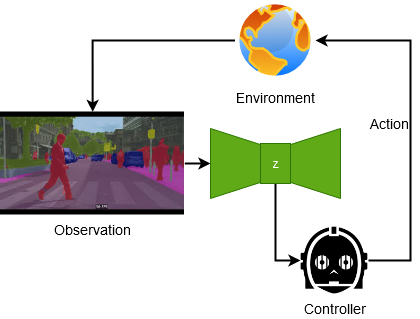Seminar: Deep Learning for Autonomous Systems
Prof. Dr. Abhinav Valada
Co-Organizers:
Daniel Honerkamp Juana Valeria Hurtado Dr. Daniele Cattaneo Dr. Tim Welschehold Nikhil Gosala Eugenio Chisari
Deep learning has become a key enabler of real world autonomous systems. Due to the significant advancement in deep learning, these systems are able to learn various tasks end-to-end, including for perception, state estimation, and control, thereby making important progress in object manipulation, scene understanding, visual recognition, object tracking, and learning-based control, amongst others. In this seminar, we will study a selection of state-of-the-art works that propose deep learning techniques for tackling various challenges in autonomous systems. In particular, we will analyze contributions in architecture design, and techniques selection that also include computer vision, reinforcement learning, imitation learning, and self supervised learning.

| Seminar: | Online via Zoom, Meeting ID: 82385475733, Passcode: Ys+2F85=4 Places: Max. 12 students |
| Beginning: | Friday 6. Nov, 14.00-16.00 Introduction via Zoom and allocation of seminar topics via email. Introductory lecture slides can be downloaded here. How to give a presentation slides can be downloaded here. As discussed, they reflect general presentation rules and might not include all requirements of the seminar presentation. |
| Requirements: | Basic knowledge of deep learning or reinforcement learning. |
| Remarks: | Due to the Corona crisis, the entire seminar will be held online. Topics will be assigned for the seminar via a preference voting. If there are more interested students than places, places will be assigned based on priority suggestions of the HisInOne system and motivation (tested by asking for a short summary of the preferred paper). The date of registration is irrelevant. In particular, we want to avoid that students grab a topic and then leave the seminar. Please have a coarse look at all available papers to make an informed decision before you commit. |
Procedure
- Enroll through HISinOne, the course number is 11LE13S-7313-M. Registration period for the seminars in HisInOne is 02/11/2020 to 11/11/2020.
- Attend the introductory session on 06/11/2020 via Zoom, Meeting ID: 82385475733, Passcode: Ys+2F85=4
- Students should select three papers out of the list in preference order and fill the information in this form
- Places will be assigned based on priority suggestions of HisInOne and motivation of the student by 25/11/2020.
- Students are requested to prepare a 20 minutes talk, write an abstract and a summary.
- The Seminar will be held as a virtual "Blockseminar" on 05/02/2021.
- The abstract should be two pages long in total and is due 08/01/2021. Please use this template.
- The details of the presentation and the slides should be discussed with the supervisor two weeks before the presentation. Please use this template.
- The summary is due 19/02/2021 and should be seven pages long at maximum (same template as abstract) not counting the bibliography and figures. Significantly longer summaries will not be accepted.
- Ensure you cite all work you use including images and illustrations. Where possible, try to use your own illustrations.
- The final grade is based on the oral presentation, the written abstract, the summary, and participation in the blockseminar.
Topics
- End-to-End Robotic Reinforcement Learning without Reward Engineering
Supervisor: Eugenio Chisari - Learning quadrupedal locomotion over challenging terrain
Supervisor: Eugenio Chisari - One Policy to Control Them All:Shared Modular Policies for Agent-Agnostic Control
Supervisor: Daniel Honerkamp - Opal: Offline Primitive Discovery for accelerating offline Reinforcement Learning
Supervisor: Daniel Honerkamp - Euclideanizing Flows: Diffeomorphic Reduction for Learning Stable Dynamical Systems
Supervisor: Dr. Tim Welschehold - Neural Dynamic Policies for End-to-End Sensorimotor Learning
Supervisor: Dr. Tim Welschehold - Consistent Video Depth Estimation
Supervisor: Nikhil Gosala - Learning Depth with Very Sparse Supervision
Supervisor: Nikhil Gosala - ViLBERT: Pretraining Task-Agnostic Visiolinguistic Representations for Vision-and-Language Tasks
Supervisor: Juana Valeria Hurtado - Embodied Visual Recognition
Supervisor: Juana Valeria Hurtado - All about Structure: Adapting Structural Information across Domains for Boosting Semantic Segmentation
Supervisor: Dr. Daniele Cattaneo - PnPNet: End-to-End Perception and Prediction with Tracking in the Loop
Supervisor: Dr. Daniele Cattaneo
What to put into the summary?
Some questions that should be discussed are the following:
- What is the paper's main contribution and why is it important?
- How does it relate to other techniques in the literature?
- What are strong and what are weak points about the paper?
- What would be interesting follow-up work? Any possible improvements in the methods? Any further interesting applications?
Submission
Please submit files per mail directly to your topic supervisor.

